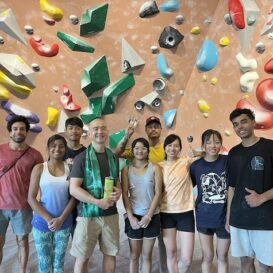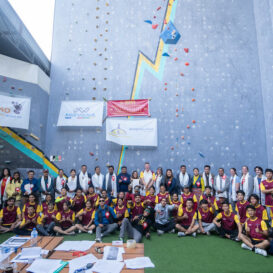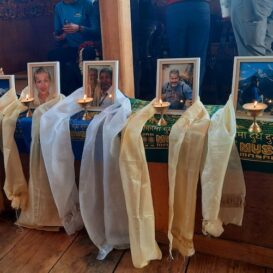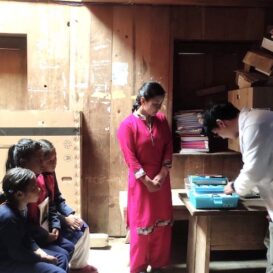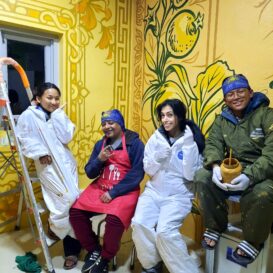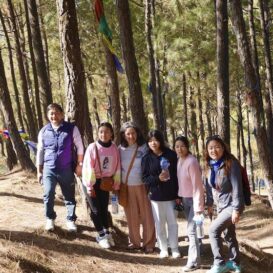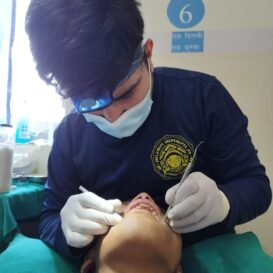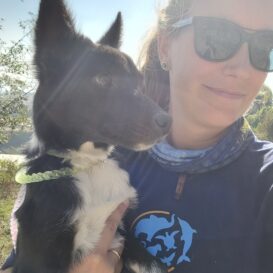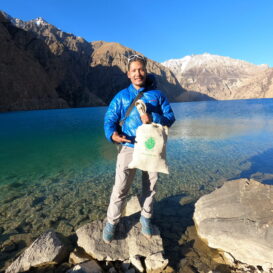Recently our very own Kunga Sherpa sat down to interview his beautiful grandmother, Chhiri. They chatted about her childhood, her secrets to a happy marriage, what Wongchu Sherpa and the soon-coming hospital mean to the people of her village and more!
1. What is your name? My name is Chhiri Sherpa.

2. When and where were you born?
I was born in 1945 AD. In, chhermading which locate in okhaldunga district of Nepal.
3. What kinds of things did your family do together when you were young?
I grew up in an agricultural society, so as I was growing up, I was always involved in farming, feeding the animals and looking after them.
4. What are some of your favourite things? Favourite colours? Favourite flowers? Favourite songs? Favourite foods?
My favourite thing is jewelry. I especially like the colour blue. My favourite flower is the rhododendron in the springtime. I love to hear old, melodious songs. My favourite food to eat is potato.
5. Did you attend school?
No, I didn’t, as there was no school in my nearby village.
6. What does the School in Chyangba mean to you and your family?
The School in Chyangba, constructed and operated by the late Wongchu Sherpa, means a bright future for the children in rural areas and it will create an educated society. I believe an uneducated person is a blind person in this modern age.
7. When and where were you married?
I got married when I was 17 years old in Chyangba Village—which is where my husband is from. He and his family asked my family for permission to marry me. After they accepted I got married to him.
8. What’s the secret to a happy marriage?
While I was married, there was no means of communication such as a telephone, the internet like nowadays. I had an arranged marriage. I had only seen my husband’s face and heard his name on the day of our wedding. We didn’t know the behavior of each other, so we were both feeling so shy when we got married.
I think the secret is to have a good relationship from your introduction and understand each other’s backgrounds. Then you can could start your new life, whatever may come—comedy or tragedy.
9. What are some special memories you have about your children?
It’s really lovely to have children. I gave birth to two sons and three daughters. However, only my two daughters are alive, as the others passed away in their childhood. I think this is due to no proper healthcare and poor nutrition. My children use to play, sing, run and talk interestingly, however some were naughtier than others! We originate from a poor family so we can’t provide the best services and facilities, but they are a big part of our hearts.

10. What do you hope for your children and grandchildren?
As I am getting old now, I hope for my children and grandchildren to be self-dependent, famous and honourable in the future and I expect them to fulfil the dreams they want. I am especially hoping for a great future for you—my grandson, Kunga Sherpa.
11. What are some of the most important lessons you feel you have learned over the course of your life?
Life is both happy and sad. The outlook chosen depends upon the person. I think literacy is like the sunlight for every person in this 21st century.
12. What are some of the important choices or decisions you made that you have learned from?
I didn’t get a proper education from a school. However, my father and mother provided me with some special tips for my life. These included: God knows what is true and false, you must try to be an honest person; it is important to save culture and religion; and never think badly of others.
13. What would you say you know now about living a happy and successful life that you didn’t know when you were 20?
1) Try to learn more.
2) Don’t fall into bad habits.
3) Follows the suggestion of teachers and guardians.
4) Don’t think badly of others.
5) Be cooperative with friends and relatives.
6) Have respect for people older than you, and have love for those smaller than you.
14. What are your favourite things to do now?
I enjoy recollecting the days that have past.
15. What are you most proud of?
I don’t have pride in any one thing. I take satisfaction from each day and whatever the day may bring.
16. What have you not done that you still hope to achieve?
At the moment I am taking care of my grandchildren, feeding them and sending them to school. I make sure they have a good life and get a good education. I especially want them to be happy and enjoy life, and for our society to continue to develop.
17. What will the Wongchu memorial hospital mean to you and your family?
There is no hospital near our society at the moment. We depend on the Shaman for healing. If someone has pain or a disease it is quite difficult to get help and most people die as a result of the lack of healthcare facilities. A lot of pregnant women die, or their babies do, due to the lack of health services to assist and carry out check-ups. Only the rich can go to the city for health care.
There are some government hospitals, however they cannot provide proper healthcare service for the people due to the lack of technology and qualified personal. A lot of doctors don’t wish to work in rural areas such as the lower Solukhumbu region. The late Wongchu Sherpa acknowledged these problems and decided to construct a hospital along with the help from his good friends. Since his passing, Ang Phula Sherpa is going to complete his wish.
I think this hospital will really be like a heaven for our village.
I thank God for the donors and I hope the project will work well. It will be one of the most memorable and happiest days in our lives.
18. What is your favourite memory of Wongchu Sherpa?
He was an excellent leader of our society. I remember the days when he started the projects of electricity, the school and the roads. He made great success for our society.
19. What is your favourite mountain in Nepal?
Mount Everest, CHOMOLONGMA (in Sherpa language), is my favourite mountain.
20. How would you describe of the earthquake in Nepal last year?
I faced a moment like it before, 60 years ago. Such occurrences are was very frightening as they take the lives of thousands of Nepali people, make people homeless and leave them without a family. The earthquake pushed back the economy many years and increased the number of poor people in Nepal. Last year a lot of cultural beauties were damaged too. I am now hoping that everything is reconstructed soon, and I am grateful for the help from everyone.
— Interview conducted by Furi Sherpa, known as “Kunga” to friends and family

